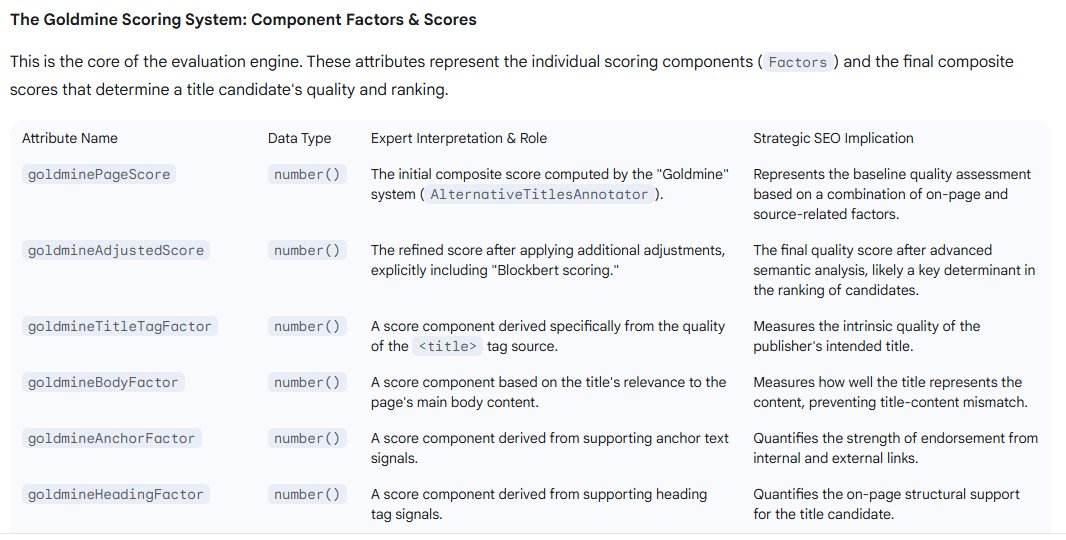Table of Contents


Want to Boost Rankings?
Get a proposal along with expert advice and insights on the right SEO strategy to grow your business!
Get StartedA recently uncovered internal scoring system called “Google Goldmine” appears to evaluate how well web pages’ titles, headings, and anchor text align with Google’s search algorithms, potentially revealing part of the mystery behind why certain pages rise to the top.

The SEO community has been buzzing since a curious discovery surfaced from an older Google data leak.
According to analyst Shaun Anderson, a system known as the Google Goldmine Scoring System rates web content using several internal factors ( including title tags, headings, anchor text, and body content) to assign what Google calls a goldminePageScore.
Free SEO Audit: Uncover Hidden SEO Opportunities Before Your Competitors Do
Gain early access to a tailored SEO audit that reveals untapped SEO opportunities and gaps in your website.

🚨The “Goldmine” system rates title tags. It evaluates “title candidates” (your title, h1, headings, and anchor text) using dozens of signals to calculate goldminePageScore. The highest-scoring candidate is the one most likely to be shown in search results. New @rustybrick ? pic.twitter.com/uKeULMTvgm
— Shaun Anderson (@Hobo_Web) October 6, 2025
He posted screenshots from leaked internal documents showing attributes like:
- goldminePageScore
- goldmineAdjustedScore
- goldmineTitleTagFactor
- goldmineBodyFactor
- goldmineAnchorFactor
- goldmineHeadingFactor

How “Goldmine” Might Actually Work
Anderson’s analysis describes Goldmine as an internal scoring engine that evaluates potential titles for a webpage. It doesn’t trust what a site provides by default. Instead, it gathers alternatives (from a page’s own headings, internal links, or even other websites that link to it) and then scores each option on relevance, readability, and performance..
Each candidate is tested against a series of AI models and data-driven factors:
- GoldmineBodyFactor: checks how well the title matches the actual content.
- GoldmineUrlMatchFactor: compares it to the page’s URL for topical alignment.
- GoldmineTrustFactor: evaluates the trustworthiness of the source.
- GoldmineNavboostFactor: measures user engagement signals such as click quality and dwell time.
- Goldmine’s design suggests that Google is less interested in what publishers want to say and more focused on what users respond to.
If people tend to click a rewritten title and stay on that page longer, that version wins. Over time, these signals flow back into NavBoost, a system confirmed during the U.S. Department of Justice’s antitrust trial to use click data to influence search rankings.
BlockBERT and SnippetBrain
Behind the scenes, Goldmine isn’t acting alone. Anderson’s research highlights the role of BlockBERT, a compact version of Google’s BERT language model, designed to judge how natural and coherent text sounds.
If a title looks machine-generated, stuffed with keywords, or linguistically awkward, BlockBERT downgrades it. That judgment becomes part of Goldmine’s adjusted score, which ultimately determines what users see on search results pages.
In parallel, other systems like SnippetBrain and Radish perform similar checks on page descriptions and featured snippets. They evaluate snippets for clarity, query relevance, and even visual presentation.
Together, these systems create a feedback loop: user behavior influences what content appears, which in turn influences future rankings.
Titles Are “Scored,” Not Chosen
The idea that titles are treated as competitive candidates marks a shift in understanding how Google curates its results. Each title variation, whether pulled from an <h1> tag or an external anchor text, is assigned a numeric score.
The highest-scoring version becomes the displayed result, while poor-quality candidates are penalized with flags such as:
- goldmineHasBoilerplateInTitle: detects repeated, generic phrases used across multiple pages.
- dupTokens: identifies keyword stuffing.
- isTruncated: penalizes titles that exceed display limits.
When a page’s title is demoted, Google might replace it with a better candidate. The result can affect the ranking itself.
Anderson explains that Goldmine feeds into broader ranking systems like NavBoost, which depend on accurate, high-quality user engagement data. A misleading or low-quality title could distort that data, so Goldmine effectively “cleans” it before it reaches the main algorithm.
Google’s Hidden Suite of Quality Judges
Goldmine is part of a much larger web of interconnected systems. The leak references modules like:
- Radish: handles featured snippets and calculates “answer scores.”
- Muppet: extracts text for snippet generation.
- SpamBrain: identifies and neutralizes spam content.
- Glue: tracks user interactions such as scrolling and hovering.
- IndexingMobileVoltCoreWebVitals: monitors technical site quality through performance metrics.
Each operates as a specialized component, designed to evaluate a different aspect of user experience.
According to Anderson, this modular structure confirms that Google’s so-called “algorithm” is not one algorithm at all, but a collection of autonomous evaluators. Goldmine just happens to be the one focused on titles, a small but influential piece of a massive quality-control framework.
Why the Leak Matters
The implications of the Goldmine revelations reach far beyond SEO strategy. They suggest that Google’s internal systems rely on competition between candidate elements rather than simple rule-based scoring.
In practical terms, this means that every line of text visible on the search page, from the title to the meta description, may be part of a dynamic test, evaluated by AI and refined based on user behavior.
For website owners, this represents both a challenge and an opportunity. You can no longer assume Google will display your exact title. Instead, you must ensure that all visible and structural elements are coherent and consistent enough to reinforce the same message.
The Bigger Picture: Transparency and Trust
Leaks like this always stir debate about transparency. Google rarely confirms internal tools, and in this case, the company hasn’t publicly addressed the “Goldmine” system. Yet, many in the SEO field argue that knowing how titles are scored could help web creators build better, more relevant content.
Others caution against reading too deeply into partial leaks. Internal tools can have experimental names or be limited to testing environments.
Without official confirmation, Goldmine remains an intriguing but unverified glimpse into Google’s internal ranking mechanisms.
Still, the idea that titles and headings are actively scored rather than passively read could shift how the SEO community approaches optimization. It adds weight to the long-held belief that structure and semantic relationships matter as much as keywords themselves.
What You Can Learn from the Leak
Even if Goldmine’s full mechanics remain unclear, the concept aligns with practical SEO fundamentals. Here are some takeaways you can apply right now:
- Write meaningful titles that match your content’s core message. Avoid keyword stuffing or vague phrases. Google likely values clarity and context over density.
- Ensure your H1 and H2 headings support your title. Consistency between your main heading and your page title may boost perceived relevance.
- Use descriptive anchor text in links. Instead of “click here,” use terms that naturally reflect the target content’s theme.
- Keep your content cohesive. The closer your title, headings, and body align in message and tone, the more likely Google’s systems will recognize the connection.
- Review your titles in search results regularly. If Google rewrites them, consider why. It could mean your original title isn’t the most accurate reflection of your content.
Key Takeaways
- Goldmine is real. The leaked data confirms Google uses an AI-based system to score and select titles for search results.
- Publisher titles are just suggestions. Google tests alternatives drawn from headings, links, and body text.
- User behavior drives final decisions. Systems like NavBoost measure click satisfaction to refine rankings.
- Technical precision matters. Boilerplate text, keyword stuffing, or long titles trigger penalties.
- SEO is now experience-driven. Success depends on satisfying intent, not gaming the system.
About the author
Share this article
Find out WHAT stops Google from ranking your website
We’ll have our SEO specialists analyze your website—and tell you what could be slowing down your organic growth.














